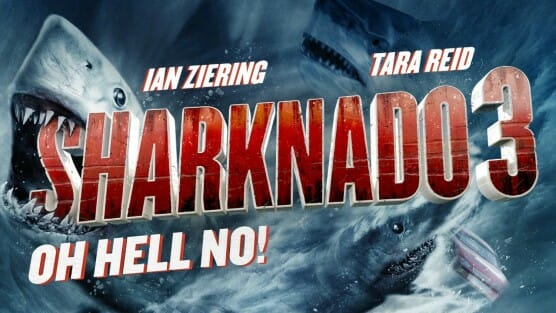Sharknado 3: Oh Hell No!

Making a purposefully bad movie, one that is entertaining due to its own badness, is an extremely difficult thing to pull off. It’s harder than making a good movie. It’s harder than trying to make a good movie and failing at it. It takes the deft touch of a genuinely skilled filmmaker who is willing to simply wallow in the badness WITHOUT winking at the audience to let you know he’s above the joke. If you want to make a bad movie, you’ve legitimately got to make it badly. And that’s not a choice that most “non-bad” directors are able to force themselves to embrace.
Anthony C. Ferrante, the director of all three entries in the Sharknado series, seems to know this. In fact, his understanding of his role seems to have become more clear than ever in the production of Sharknado 3: Oh Hell No!, which has its world premiere on Syfy tonight. If these films are exercises in poor taste (and they are), he’s discovered new ways in the third entry to trigger that gag reflex, but at the same time has also crafted a more purely entertaining outing here than in the first sequel, Sharknado 2: The Second One.
-

-

-

-

-

-

-

-

-

-

-

-

-

-

-

-

-

-

-

-

-

-

-

-

-

-

-

-

-

-

-

-

-

-

-

-

-

-

-

-

 Fin is inducted into “The Order of the Golden Chainsaw” by President Mark Cuban
Fin is inducted into “The Order of the Golden Chainsaw” by President Mark Cuban






































